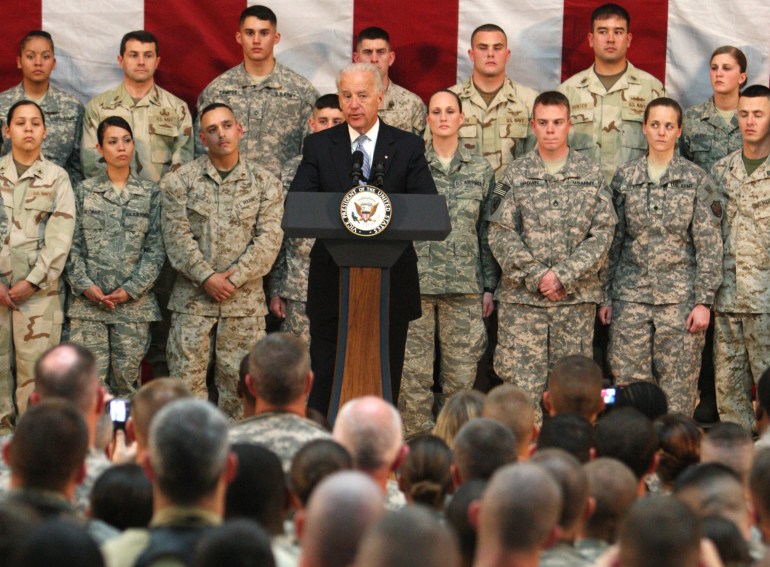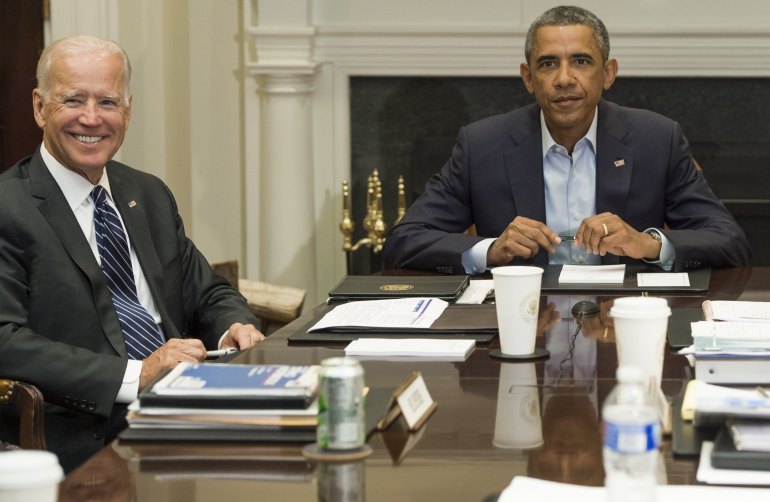Joe Biden and the future of Iraq-US relations
New US leader’s policy towards Iraq remains unclear, but Biden has a long and controversial legacy in the oil-rich country.

Ahead of the election, the US presidential candidates were vocal on important foreign policy issues in the Middle East including Iran, Saudi Arabia and Israel-Palestine, but debate was visibly absent on one critical issue – Iraq.
Many observers believe the silence is because Iraq is a secondary foreign policy issue for the US, that other Middle East affairs – including the Iran nuclear deal and the Israeli-Palestinian conflict – present more pressing concerns.
Keep reading
list of 4 itemsWhat will a Biden presidency mean for Iran?
Will President-elect Joe Biden change US foreign policy?
Will Joe Biden alter US policy in the Middle East?
It remains unclear the kind of approach the new US administration will adopt in the Middle East, and more particularly on Iraq. But president-elect Joe Biden has a long history of involvement in the oil-rich country – and a controversial track record since the early 2000s.
And so, while Iraqi leaders including Iraqi President Barham Salih and Prime Minister Mustafa al-Kadhimi congratulated Joe Biden soon after the announcement of his victory, Baghdad remains cautious but hopeful of prosperous relations ahead.
“Biden is well known to all the major Iraqi leaders who have met with him many times,” said Michael Knights, a fellow at The Washington Institute.
“This is reassuring for them and indicates that Iraq will get good attention in the Biden White House,” added Knights, who specialises in the military and security affairs of Iraq and Iran.

Iran policy
Washington’s approach towards Baghdad gradually lost its clarity after the Iraq War wound down during the Barack Obama presidency. Although an Iraq policy remained vital for the US, its focus has centred on Iran and, in more recent years, on the fight against the armed group ISIL (ISIS).
As Iraq continues to be caught in a tug of war between Tehran and Washington, American policies on Iran tend to spill into its Arab neighbour.
When Washington ordered an air strike against Iranian military commander Qassem Soleimani in January, the drone also killed Abu Mahdi al-Muhandis, deputy commander of Iraq’s Hashd al-Shaabi, an Iran-backed umbrella organisation of militias.
The incident pushed Iran-US relations onto a collision course that played out on Iraqi soil. Washington targeted Iran-backed militias while they ramped up a campaign of attacks on US interests in Iraq.
Similarly, when the US slapped sanctions on Iran, the pressure was felt in Iraq and several pro-Iran militia figures were targeted.
Speaking from Baghdad, a senior government official told Al Jazeera he hoped Biden’s administration would not only be “more engaged with Iraq” but also have a distinct Iraq policy rather than “view Iraq as an appendage of their Iran policy”.
Still, the official – who asked to remain anonymous – said if the Biden administration were to return to negotiations and diplomacy with Iran, “this would be good for Iraq given that Iraq is inescapably stuck between the two”.
‘Iranian bad behaviour’
Even if Washington’s Iraq policy remains closely tied to Iran, some analysts say a potential rollback in Donald Trump’s hawkish approach towards Tehran – which saw Washington pull out of the Iran nuclear deal, also known as the Joint Comprehensive Plan of Action (JCPOA), and impose unforgiving economic sanctions as part of a “maximum pressure” campaign – would benefit Baghdad as well.
“If Iran and the US move towards negotiations, that will be important for Iraq, especially that problems in US-Iraqi relations relate to an Iranian dimension,” said Abbas Kadhim, director of the Iraq Initiative at the Atlantic Council, adding that de-escalation between Tehran and Washington could bring more stability to the country.
According to Knights, while Biden will have to “hold a detailed review concerning how to prevent re-engagement from encouraging Iranian bad behaviour”, Tehran and its allies in Iraq are unlikely to antagonise the US in the coming period.
“Iran would be hesitant to take any action that might disrupt US willingness to re-enter the JCPOA, so Iran-backed militias would need to be cautious in Iraq not to hurt Americans or Washington’s international partners,” he said.

Biden’s Iraq legacy
As chair of the US Senate in 2002, Biden voted for a resolution that led to the US invasion of Iraq a year later. He also served as vice president to Obama, playing a key role in the drawdown of 150,000 American troops from the country in 2011.
Although many supported the move at the time, it created a security vacuum amid a sectarian crisis in Iraq that paved the way for the rise of ISIL. By 2014, the armed group occupied large swathes of Iraqi territory – a development that brought US forces back to the country as part of an international coalition to fight ISIL.
Biden is also known for co-authoring a controversial 2006 article that called for the decentralisation of Iraq along ethnic and religious lines, giving the Kurds, Sunnis and Shia, “room to run” their own affairs, “while leaving the central government in charge of common interests”.
Seen as a plan to divide and further deepen sectarian divisions in Iraq, the proposal was badly received in Baghdad.
But analysts say a Biden administration will likely forge a wholly new approach to Iraq.
“Biden hasn’t in the past been on the right side. He has some pretty serious errors and lapses in judgement,” said Renad Mansour, head of the Iraq Initiative at London’s Chatham House.
“[But] people close to Biden’s team are aware of these past mistakes and look to move forward with a new approach.”
Ihsan al-Shammari, head of the Baghdad-based Iraqi Centre for Political Thought, agreed: “There may be some residue from his previous approach, but that doesn’t mean Biden will have the same recommendations for Iraq.
“Biden will draw a new policy to what he’d envisioned during the Obama administration or before that.”

Dialogue, US troops
With 10 weeks still to go before the inauguration of the new president, the impact of Trump’s policies in the Middle East are expected to continue for a while.
“There may be even more of an escalation in the final months of this administration in Washington … particularly by those in the Trump administration who are ideologically quite anti-Iran and anti-Iran in Iraq,” said Mansour.
Recent reports suggest the Trump administration plans to slap a list of new sanctions on Iran – a move that could exacerbate tensions in Iraq.
Still, analysts expect US-Iraq relations to remain within the standard protocol, at least in the short term, as a strategic dialogue launched in June continues to address economic engagement and security cooperation, among other topics.
Knights said security is “the heart of the strategic dialogue”.
Biden has vowed to bring US combat troops home from Iraq and Afghanistan, leaving only a small number of counterterrorism forces. The US is therefore expected to remain on course with withdrawing more than one-third of its 5,200 troops in Iraq to bring the level down to 3,000 by the end of the year.
The sway of ISIL has been largely contained compared with the period between 2014 and 2017, allowing foreign troops to gradually withdraw from a handful of bases over recent months – a move accelerated by Iranian-backed armed groups targeting US positions.
Still, a complete withdrawal of US forces from Iraq remains unlikely.
“US participating forces in the coalition are scheduled to remain in Iraq under the Biden administration, which is a strong supporter of US support to Iraq’s military against Daesh,” said Knights, using the Arabic acronym for ISIL.
Although ISIL has not claimed responsibility for a deadly attack by gunmen west of Baghdad on Sunday night, the incident was a strong reminder that armed groups still pose a threat to Iraq, and the presence of some US troops – even if for advisory purposes – might be necessary.
